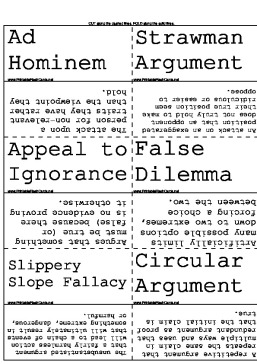

Great for rhetoric classes and political debates, these printable flash cards cover different logical fallacies
There are 15 flash cards in this set (3 pages to print.)
To use:
1. Print out the cards.
2. Cut along the dashed lines.
3. Fold along the solid lines.
Sample flash cards in this set:




| Questions | Answers |
|---|---|
| Ad Hominem | The attack upon a person for non-relevant traits they have rather than the viewpoint they hold. |
| Strawman Argument | An attack on an exaggerated position that an opponent does not truly hold to make their true position seem ridiculous or easier to oppose. |
| Appeal to Ignorance | Argues that something must be true (or false) because there is no evidence proving it otherwise. |
| False Dilemma | Artificially limits many possible options down to two extremes, forcing a choice between the two. |
| Slippery Slope Fallacy | The unsubstantiated argument that a fairly harmless action will lead to a chain of events that will ultimately result in something extreme, dangerous, or harmful. |
| Circular Argument | A repetitive argument that repeats the same claim in multiple ways and uses that redundant argument as proof that the initial claim is true. |
| Hasty Generalization | An argument based on a few or insufficient examples or anecdotes rather than data that can be proven or verified. |
| Red Herring Fallacy | An argument that hinges on something irrelevant to the subject that is used to distract or confuse the real issue. |
| Appeal to Hypocrisy | The deflection of blame and criticism away from the self by pointing out the flaws or hypocrisy of the opponent. |
| Causal Fallacy | The fallacy of coming to a conclusion without proper evidence or information (also mistaking correlation for causation). |
| Fallacy of Sunk Costs | The assumption that one must stick with something bad, unwanted, or harmful simply because they have already invested time, money, effort, etc. that they cannot get back. |
| Appeal to Authority | Applying unearned credibility to a viewpoint simply because the person holding it is in a position of authority, especially if their credentials are not relevant to the subject. |
| Equivocation | Words, phrases, promises, or arguments that are deliberately vague or designed to confuse, deceive, or have double meanings. |
| Appeal to Pity | An attempt to exploit the feeling of empathy and pity in the listener to make them more lenient or understanding of a viewpoint. |
| Bandwagon Fallacy | The assumption that something is good or right simply because a lot of other people support or believe in it. |